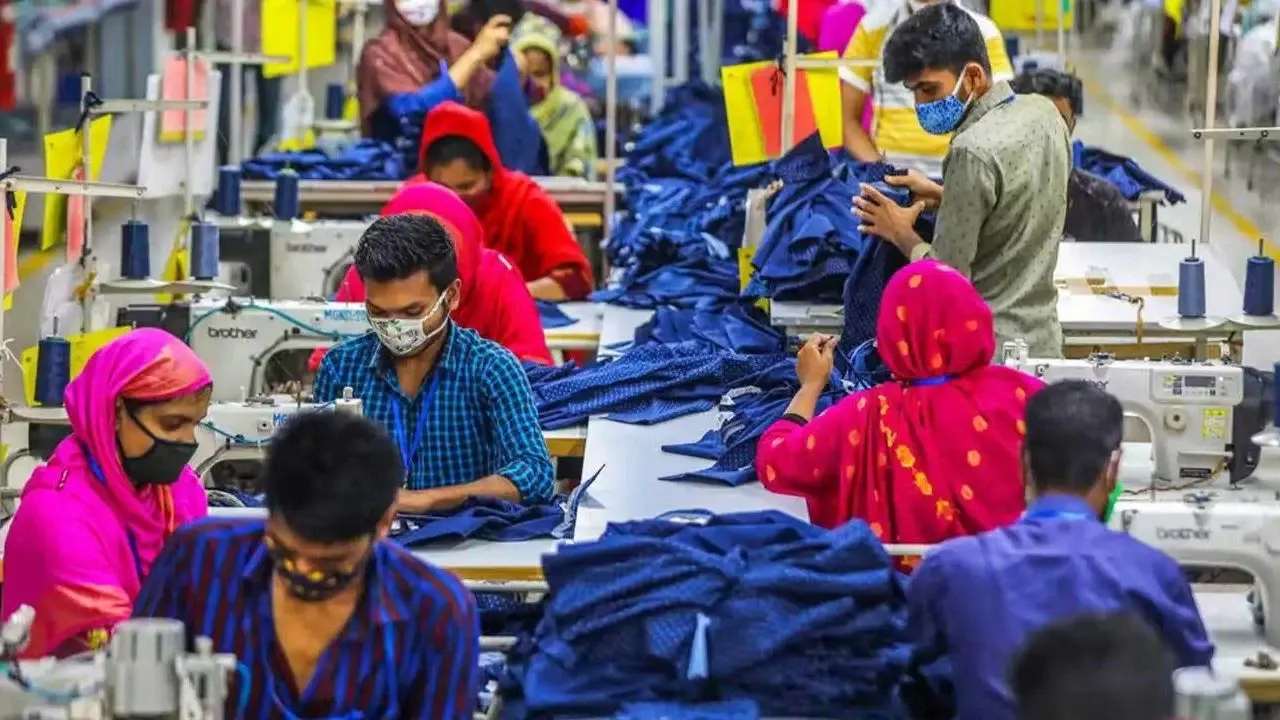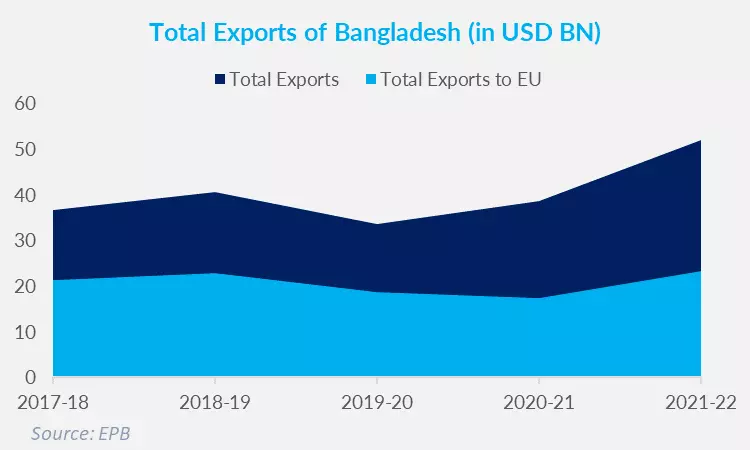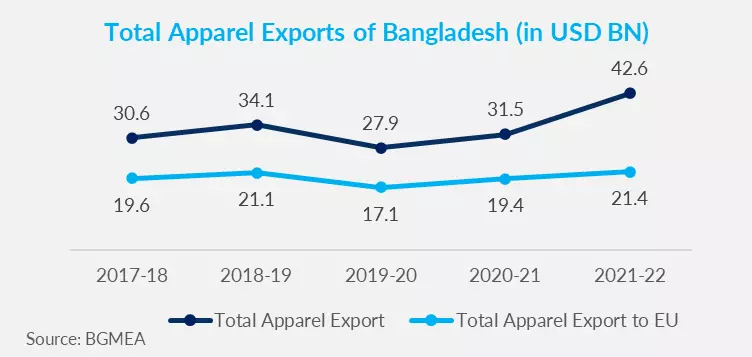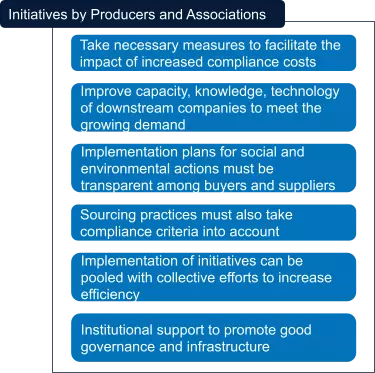GET IN TOUCH
- Please wait...

Photo Credit: Business Inspection
The apparel sector, also known as the ready-made garment (RMG) industry, has a relatively short but significant history in Bangladesh. The RMG industry began to take shape in the late 1970s and early 1980s, when the late Nurool Qader Khan, the pioneer of RMG in Bangladesh, sent 130 trainees to South Korea, where they learned how to produce ready-made garments [1]. However, it was not until the early 1990s that the industry really gained traction and became a major contributor to the economy.
It is a vital component of Bangladesh’s economy, contributing significantly to the country’s economic growth, job creation, and export earnings. The RMG industry is the largest contributor to Bangladesh’s economy, accounting for approximately 81.82% of the country’s total export earnings [2]. It is Bangladesh’s biggest export earner, with a share of 42,613 MN USD of export earnings in FY 2021–22 [2]. In FY 2021-22, the RMG sector contributed 9.3 percent to Bangladesh’s GDP [3]. Bangladesh’s overall RMG export earnings were 35.5 percent higher than that of the previous fiscal year [3]. It is also the second-largest employer in the country, providing jobs to over 4 million workers, more than 58 percent of whom are women [4].
Over the past few decades, the European Union (EU) has evolved to become a vital trade and development partner for Bangladesh. The EU, which imports about half of the country’s export goods, is by far the nation’s largest export market [5]. They are one of the country’s major trading partners, particularly in the ready-made garment (RMG) sector. During FY2021–2022, the EU Region stood first with 44.6% of the total export earnings of Bangladesh [2].

Bangladesh is a beneficiary of the EU’s GSP scheme, which provides duty-free and quota-free access to the EU market for a wide range of products, including textiles and garments. The GSP scheme is aimed at promoting sustainable development and good governance in developing countries. Bangladesh has been a beneficiary of the EU-GSP scheme for LDCs since 1971 [6]. The country is also a beneficiary of the EU’s Everything But Arms (EBA) initiative, an arrangement of GSP, which provides duty-free and quota-free access to the EU market for all products except arms and ammunition. The EBA scheme is designed to help the world’s least developed countries integrate into the global economy and reduce poverty. And the country has been a beneficiary of the EBA scheme since 2001.
In addition to the GSP and EBA, the EU and Bangladesh have also signed several trade-related agreements aimed at strengthening their economic ties and promoting sustainable development. These agreements cover various areas such as investment, intellectual property, and labor rights.
In March 2021, the European Union (EU) announced mandatory Human Rights and Environmental Due Diligence (mHREDD) to encourage companies to prioritize responsible and sustainable business practices, including the fair treatment of all individuals in their supply chains and reducing environmental impacts [7]. The legislation aims to ensure that human rights are respected and that the environment is protected throughout the entire supply chain. These issues are becoming increasingly important, and the new legislation is designed to encourage action from companies to address them.
The due diligence directive sets out regulations that require large companies to take responsibility for any actual or potential harm caused to human rights and the environment by their own operations, as well as those of their subsidiaries and business partners. The directive also establishes penalties and civil liability for any violations of these obligations. Additionally, companies must adopt a plan that ensures their business model and strategy align with the Paris Agreement [8].
The regulations of the due diligence directive are applicable to both major EU companies and non-EU companies operating within the EU. Companies that fall under these obligations:
The European Union (EU) is a trading partner of Bangladesh, accounting for almost half of the country’s total exports [5]. Bangladesh’s exports to the EU increased from just 2 BN USD in FY 2000–01 to 23.2 BN USD in FY2020–21 [5]. More than 90% of this, or 21.4 billion USD, is attributable to apparel items alone (RMG) [5]. The GSP facilities have allowed Bangladeshi-made clothing to be imported into the EU market without tariffs or quotas, giving our manufacturers a considerable cost advantage and making our exports highly competitive.

It has numerous benefits for developing nations like Bangladesh, including the promotion of export growth, acceleration of GDP expansion, and decrease in unemployment. These commendable objectives are aligned with the Sustainable Development Goals (SDGs), particularly those related to decent employment, poverty reduction, and women’s empowerment.
According to the United Nations Committee for Development Policy (UNCDP), the country is scheduled to graduate from its LDC status in November 2026 [9]. Although this formative accomplishment calls for celebration, the risks related to this change in the country’s status cannot be obscured. When it graduates in 2026, trade benefits associated with LDCs will end immediately in nations including Canada, China, India, and Japan. But the EU (and the UK) are expected to offer a three-year grace period, extending the EBA trade privileges up until 2029 [5].
The new GSP+ regime proposed by the EU for 2024–34 might end preferential treatment for Bangladesh’s clothing items due to safeguard measures stated in Article 29. Eligibility for GSP+ benefits on other products will depend on compliance with 32 specified international conventions, an increase from the current 27. Bangladesh has ratified 20 of these conventions and acceded to the remaining 12 as of June 2022 [5].
So whether the country will qualify for GSP+ depends on its success in ratifying the remaining conventions and effectively implementing all of them, potentially leading to significant alterations to its market access terms with the EU in the upcoming years. These alterations will have a direct impact on Bangladesh’s export earnings in different sectors from the EU, and the RMG industry will not be excluded either.
The European Commission’s (EC) new proposal to ban products made using forced labor with legislation is likely to have a significant impact on the RMG export market in Bangladesh if it comes into force [10]. The proposed law would prohibit the import of goods into the EU that are produced wholly or partly with forced labor, regardless of whether the work took place in the EU or a third country.
The products found to be having a link to forced labor in their supply chains for raw materials would have to pay a penalty, and the companies importing from such suppliers could face penalties and reputational damage [11].
As for Bangladesh, its RMG industry is heavily dependent on raw materials that are imported for the apparel industry. These raw materials include cotton (all types), cotton yarn or thread, and cotton fabrics. Import payments during the financial year 2021–22 amounted to 75,604 MN USD, out of which 10,058 MN USD were cotton imports [12].
Our major import destinations for cotton are China and India. Other than these two places, Bangladesh fulfills its demand for cotton by importing it from Brazil, Vietnam, Pakistan, the USA, Taiwan, Indonesia, and some other countries.
The European Union (EU) executive proposal does not explicitly mention any country. However, it followed a European Parliament call last June for such a law that addresses human rights concerns in China’s Xinjiang region. Beijing has been accused of committing abuses and human rights violations against the Uyghurs, who are predominantly Muslim and belong to an ethnic minority in the Xinjiang region of China [10]. These violations include the alleged use of mass forced labor in internment camps. The United States has accused China of committing genocide and passed a law in 2021 that prohibits the import of goods from Xinjiang. However, China denies all these allegations. Also, a draft document reviewed by the South China Morning Post reveals that the EU’s new proposed legislation does include such prohibition or ban on the import or promotion of goods produced through forced labor[11].
Bangladesh has again regained its position as the second-largest apparel exporter globally. According to the World Trade Statistical Review 2022, released by the World Trade Organization, the share of Bangladesh in the global RMG market increased to 6.4 percent in 2021 from 6.3 percent in 2020 [13]. And China is the biggest cotton importer of Bangladesh. In FY 2021–22, Bangladesh imported 2,276 million USD worth of cotton from China [12]. If Bangladesh’s RMG industry fails to ensure that its supply chains are free from forced labor, it may face legal and reputational risks, along with the possibility of a ban in the EU market. This could impact the competitiveness of the industry and reduce demand for its products in the EU market. And since the EU is the largest export market for Bangladesh’s RMG industry, the country can witness a significant change or downfall in its total export earnings.
The EU’s new law of diligence for forced labor could significantly impact Bangladesh’s RMG exports to the EU, as companies importing Bangladeshi products into the EU will be required to ensure that forced labor is not being used in their supply chains. If companies fail to comply with this regulation, they could face fines and other penalties, leading to a decline in demand for Bangladesh RMG products.
Also, the industry has been under scrutiny for poor working conditions, low wages, and labor rights violations, including the use of forced labor. A recent survey indicated that apparel workers are participating in inhuman working hours of 11-12 hours daily with a 1 hour lunch break in between. Additionally, payments for overtime hours and festival bonuses are often due, causing lack of motivation. Lastly, the fear of sudden layoff increases and availability of workforce lead to women not protesting their workplace concerns such as proper WASH facilities and gender-based harassment [14]. Even though such cases have diminished over the years, some still persist. Producers of apparels and their associations must imply certain initiatives in their value chain – from the procurement of raw materials to the production of finished goods. The EU has suggested a list of interventions that can possibly mitigate the problems in hand and ensure to keep supplying to European buyers [15].

To address this issue, the Bangladesh government has taken steps to improve labor standards in the RMG industry, including the adoption of labor laws and the establishment of a national labor helpline. Additionally, development organizations have been readily active to support apparel workers through intervention programs catering to wellbeing factors including healthcare, access to digital financial tools, skills development, legal support etc. Active participation of these organizations have helped factories maintain compliance over the years, however, such programs should be developed in-house to ensure sustainability, and these can be initiated by partnering with impact driven private-sector players as well. New initiatives with the support of suppliers and associations must be taken to remain competitive in the global market.
The article was authored by Tarunima Tabassum, Content Writer at LightCastle Partners. Advisory and editorial support was provided by Fahmid Kaisar, Business Consultant at LightCastle Partners. For further clarifications, contact here: [email protected]
Our experts can help you solve your unique challenges
Stay up-to-date with our Thought Leadership and Insights